London Law LLP Internship Report: UK Law, Remedies, and Ethics
VerifiedAdded on 2022/11/24
|7
|1705
|228
Report
AI Summary
This report provides an overview of key legal concepts and ethical considerations within the context of a London Law LLP internship. It begins with an introduction to the separation of powers in the UK, examining the roles of the executive, judiciary, and legislature. The report then delves into the remedy of specific performance, outlining its application and limitations based on relevant case law. It further compares general partnerships and corporations concerning legal personality and liability. Finally, the report addresses the ethical implications of employee dismissal, exploring various grounds for termination. The analysis incorporates relevant legal principles and case studies to provide a comprehensive understanding of the topics discussed, offering valuable insights into the legal and ethical dimensions of the internship experience.

London Law LLP
Internship
Internship
Paraphrase This Document
Need a fresh take? Get an instant paraphrase of this document with our AI Paraphraser

Table of Contents
INTRODUCTION...........................................................................................................................3
MAIN BODY..................................................................................................................................3
CONCLUSION................................................................................................................................6
REFERENCES................................................................................................................................7
INTRODUCTION...........................................................................................................................3
MAIN BODY..................................................................................................................................3
CONCLUSION................................................................................................................................6
REFERENCES................................................................................................................................7
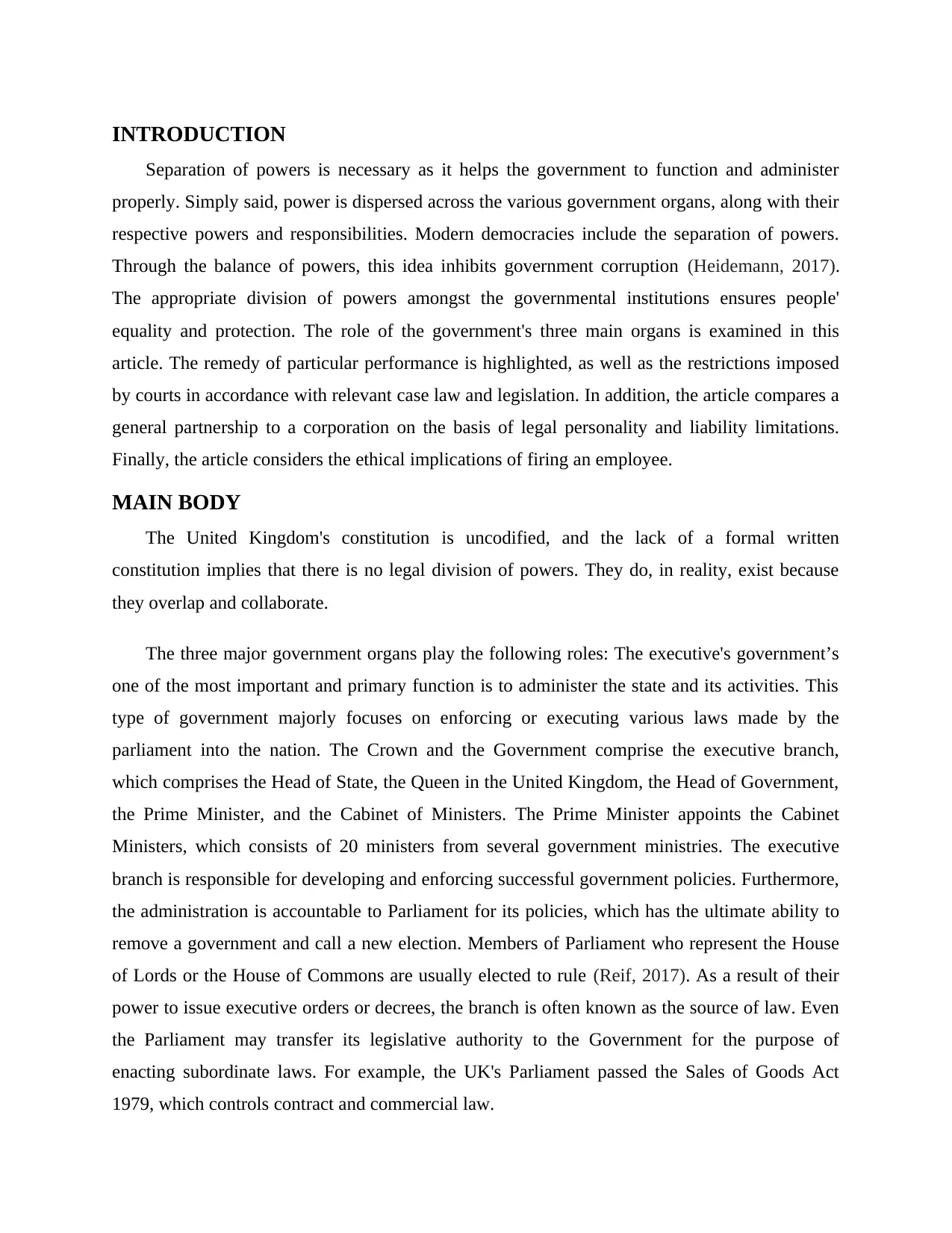
INTRODUCTION
Separation of powers is necessary as it helps the government to function and administer
properly. Simply said, power is dispersed across the various government organs, along with their
respective powers and responsibilities. Modern democracies include the separation of powers.
Through the balance of powers, this idea inhibits government corruption (Heidemann, 2017).
The appropriate division of powers amongst the governmental institutions ensures people'
equality and protection. The role of the government's three main organs is examined in this
article. The remedy of particular performance is highlighted, as well as the restrictions imposed
by courts in accordance with relevant case law and legislation. In addition, the article compares a
general partnership to a corporation on the basis of legal personality and liability limitations.
Finally, the article considers the ethical implications of firing an employee.
MAIN BODY
The United Kingdom's constitution is uncodified, and the lack of a formal written
constitution implies that there is no legal division of powers. They do, in reality, exist because
they overlap and collaborate.
The three major government organs play the following roles: The executive's government’s
one of the most important and primary function is to administer the state and its activities. This
type of government majorly focuses on enforcing or executing various laws made by the
parliament into the nation. The Crown and the Government comprise the executive branch,
which comprises the Head of State, the Queen in the United Kingdom, the Head of Government,
the Prime Minister, and the Cabinet of Ministers. The Prime Minister appoints the Cabinet
Ministers, which consists of 20 ministers from several government ministries. The executive
branch is responsible for developing and enforcing successful government policies. Furthermore,
the administration is accountable to Parliament for its policies, which has the ultimate ability to
remove a government and call a new election. Members of Parliament who represent the House
of Lords or the House of Commons are usually elected to rule (Reif, 2017). As a result of their
power to issue executive orders or decrees, the branch is often known as the source of law. Even
the Parliament may transfer its legislative authority to the Government for the purpose of
enacting subordinate laws. For example, the UK's Parliament passed the Sales of Goods Act
1979, which controls contract and commercial law.
Separation of powers is necessary as it helps the government to function and administer
properly. Simply said, power is dispersed across the various government organs, along with their
respective powers and responsibilities. Modern democracies include the separation of powers.
Through the balance of powers, this idea inhibits government corruption (Heidemann, 2017).
The appropriate division of powers amongst the governmental institutions ensures people'
equality and protection. The role of the government's three main organs is examined in this
article. The remedy of particular performance is highlighted, as well as the restrictions imposed
by courts in accordance with relevant case law and legislation. In addition, the article compares a
general partnership to a corporation on the basis of legal personality and liability limitations.
Finally, the article considers the ethical implications of firing an employee.
MAIN BODY
The United Kingdom's constitution is uncodified, and the lack of a formal written
constitution implies that there is no legal division of powers. They do, in reality, exist because
they overlap and collaborate.
The three major government organs play the following roles: The executive's government’s
one of the most important and primary function is to administer the state and its activities. This
type of government majorly focuses on enforcing or executing various laws made by the
parliament into the nation. The Crown and the Government comprise the executive branch,
which comprises the Head of State, the Queen in the United Kingdom, the Head of Government,
the Prime Minister, and the Cabinet of Ministers. The Prime Minister appoints the Cabinet
Ministers, which consists of 20 ministers from several government ministries. The executive
branch is responsible for developing and enforcing successful government policies. Furthermore,
the administration is accountable to Parliament for its policies, which has the ultimate ability to
remove a government and call a new election. Members of Parliament who represent the House
of Lords or the House of Commons are usually elected to rule (Reif, 2017). As a result of their
power to issue executive orders or decrees, the branch is often known as the source of law. Even
the Parliament may transfer its legislative authority to the Government for the purpose of
enacting subordinate laws. For example, the UK's Parliament passed the Sales of Goods Act
1979, which controls contract and commercial law.
⊘ This is a preview!⊘
Do you want full access?
Subscribe today to unlock all pages.

Trusted by 1+ million students worldwide
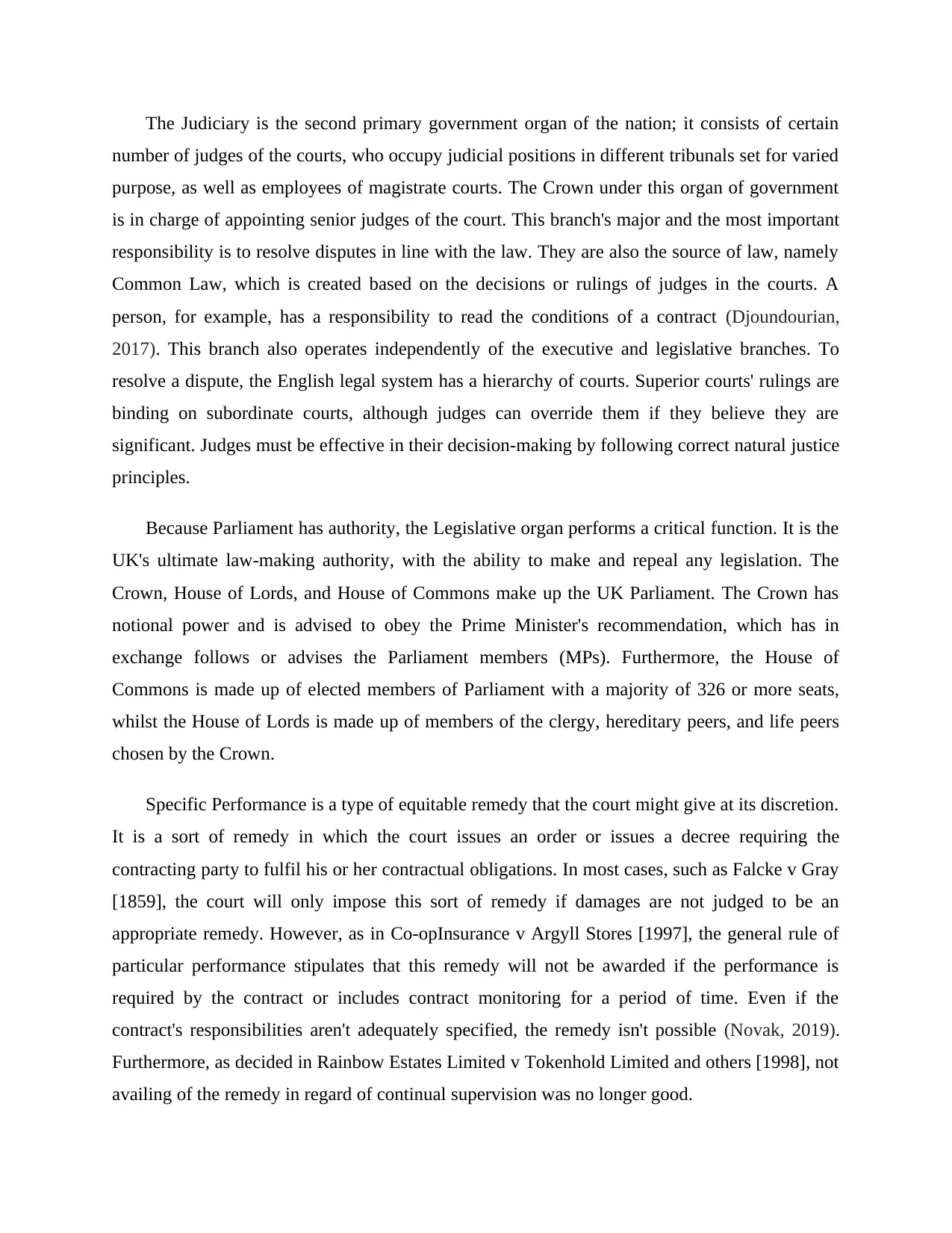
The Judiciary is the second primary government organ of the nation; it consists of certain
number of judges of the courts, who occupy judicial positions in different tribunals set for varied
purpose, as well as employees of magistrate courts. The Crown under this organ of government
is in charge of appointing senior judges of the court. This branch's major and the most important
responsibility is to resolve disputes in line with the law. They are also the source of law, namely
Common Law, which is created based on the decisions or rulings of judges in the courts. A
person, for example, has a responsibility to read the conditions of a contract (Djoundourian,
2017). This branch also operates independently of the executive and legislative branches. To
resolve a dispute, the English legal system has a hierarchy of courts. Superior courts' rulings are
binding on subordinate courts, although judges can override them if they believe they are
significant. Judges must be effective in their decision-making by following correct natural justice
principles.
Because Parliament has authority, the Legislative organ performs a critical function. It is the
UK's ultimate law-making authority, with the ability to make and repeal any legislation. The
Crown, House of Lords, and House of Commons make up the UK Parliament. The Crown has
notional power and is advised to obey the Prime Minister's recommendation, which has in
exchange follows or advises the Parliament members (MPs). Furthermore, the House of
Commons is made up of elected members of Parliament with a majority of 326 or more seats,
whilst the House of Lords is made up of members of the clergy, hereditary peers, and life peers
chosen by the Crown.
Specific Performance is a type of equitable remedy that the court might give at its discretion.
It is a sort of remedy in which the court issues an order or issues a decree requiring the
contracting party to fulfil his or her contractual obligations. In most cases, such as Falcke v Gray
[1859], the court will only impose this sort of remedy if damages are not judged to be an
appropriate remedy. However, as in Co-opInsurance v Argyll Stores [1997], the general rule of
particular performance stipulates that this remedy will not be awarded if the performance is
required by the contract or includes contract monitoring for a period of time. Even if the
contract's responsibilities aren't adequately specified, the remedy isn't possible (Novak, 2019).
Furthermore, as decided in Rainbow Estates Limited v Tokenhold Limited and others [1998], not
availing of the remedy in regard of continual supervision was no longer good.
number of judges of the courts, who occupy judicial positions in different tribunals set for varied
purpose, as well as employees of magistrate courts. The Crown under this organ of government
is in charge of appointing senior judges of the court. This branch's major and the most important
responsibility is to resolve disputes in line with the law. They are also the source of law, namely
Common Law, which is created based on the decisions or rulings of judges in the courts. A
person, for example, has a responsibility to read the conditions of a contract (Djoundourian,
2017). This branch also operates independently of the executive and legislative branches. To
resolve a dispute, the English legal system has a hierarchy of courts. Superior courts' rulings are
binding on subordinate courts, although judges can override them if they believe they are
significant. Judges must be effective in their decision-making by following correct natural justice
principles.
Because Parliament has authority, the Legislative organ performs a critical function. It is the
UK's ultimate law-making authority, with the ability to make and repeal any legislation. The
Crown, House of Lords, and House of Commons make up the UK Parliament. The Crown has
notional power and is advised to obey the Prime Minister's recommendation, which has in
exchange follows or advises the Parliament members (MPs). Furthermore, the House of
Commons is made up of elected members of Parliament with a majority of 326 or more seats,
whilst the House of Lords is made up of members of the clergy, hereditary peers, and life peers
chosen by the Crown.
Specific Performance is a type of equitable remedy that the court might give at its discretion.
It is a sort of remedy in which the court issues an order or issues a decree requiring the
contracting party to fulfil his or her contractual obligations. In most cases, such as Falcke v Gray
[1859], the court will only impose this sort of remedy if damages are not judged to be an
appropriate remedy. However, as in Co-opInsurance v Argyll Stores [1997], the general rule of
particular performance stipulates that this remedy will not be awarded if the performance is
required by the contract or includes contract monitoring for a period of time. Even if the
contract's responsibilities aren't adequately specified, the remedy isn't possible (Novak, 2019).
Furthermore, as decided in Rainbow Estates Limited v Tokenhold Limited and others [1998], not
availing of the remedy in regard of continual supervision was no longer good.
Paraphrase This Document
Need a fresh take? Get an instant paraphrase of this document with our AI Paraphraser
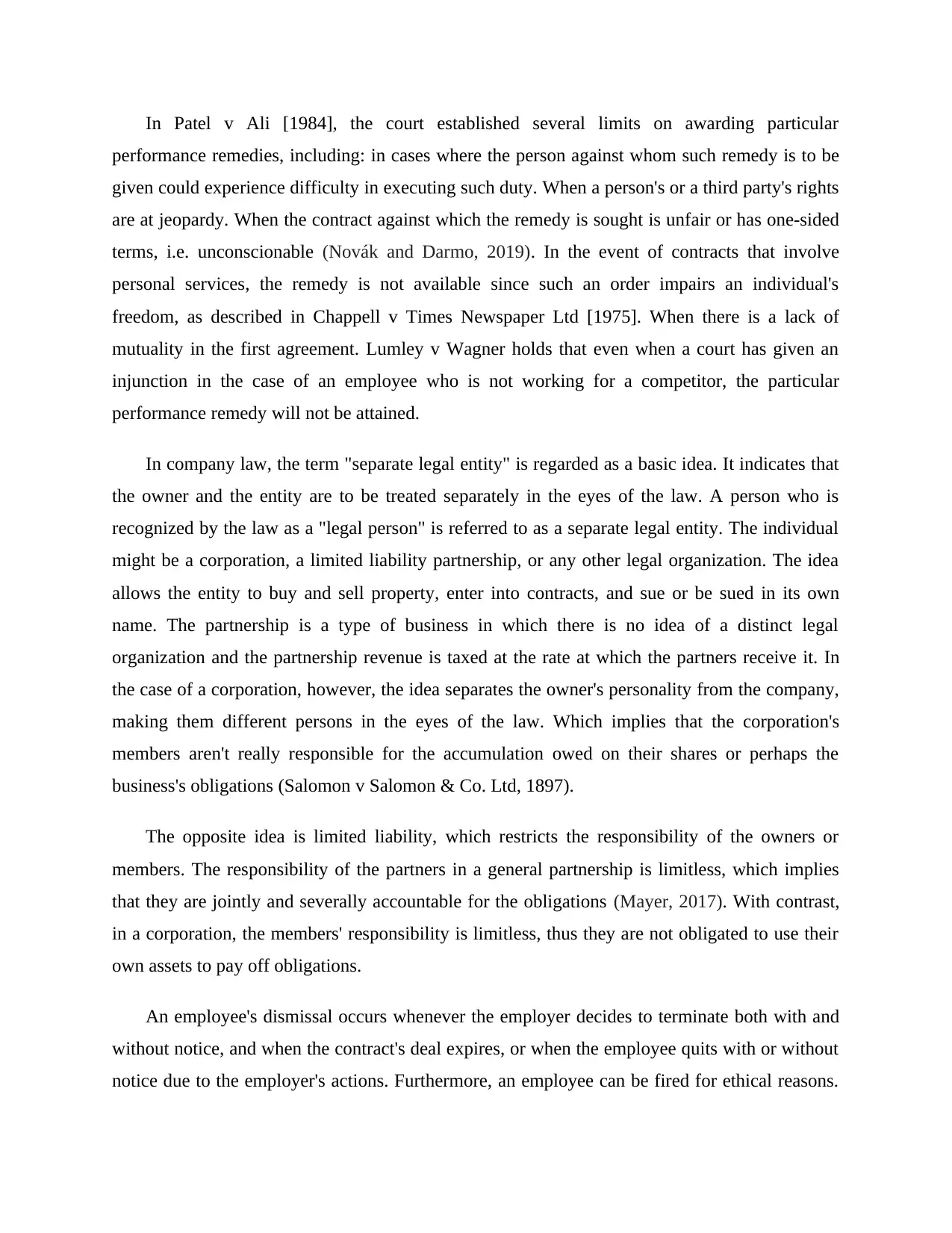
In Patel v Ali [1984], the court established several limits on awarding particular
performance remedies, including: in cases where the person against whom such remedy is to be
given could experience difficulty in executing such duty. When a person's or a third party's rights
are at jeopardy. When the contract against which the remedy is sought is unfair or has one-sided
terms, i.e. unconscionable (Novák and Darmo, 2019). In the event of contracts that involve
personal services, the remedy is not available since such an order impairs an individual's
freedom, as described in Chappell v Times Newspaper Ltd [1975]. When there is a lack of
mutuality in the first agreement. Lumley v Wagner holds that even when a court has given an
injunction in the case of an employee who is not working for a competitor, the particular
performance remedy will not be attained.
In company law, the term "separate legal entity" is regarded as a basic idea. It indicates that
the owner and the entity are to be treated separately in the eyes of the law. A person who is
recognized by the law as a "legal person" is referred to as a separate legal entity. The individual
might be a corporation, a limited liability partnership, or any other legal organization. The idea
allows the entity to buy and sell property, enter into contracts, and sue or be sued in its own
name. The partnership is a type of business in which there is no idea of a distinct legal
organization and the partnership revenue is taxed at the rate at which the partners receive it. In
the case of a corporation, however, the idea separates the owner's personality from the company,
making them different persons in the eyes of the law. Which implies that the corporation's
members aren't really responsible for the accumulation owed on their shares or perhaps the
business's obligations (Salomon v Salomon & Co. Ltd, 1897).
The opposite idea is limited liability, which restricts the responsibility of the owners or
members. The responsibility of the partners in a general partnership is limitless, which implies
that they are jointly and severally accountable for the obligations (Mayer, 2017). With contrast,
in a corporation, the members' responsibility is limitless, thus they are not obligated to use their
own assets to pay off obligations.
An employee's dismissal occurs whenever the employer decides to terminate both with and
without notice, and when the contract's deal expires, or when the employee quits with or without
notice due to the employer's actions. Furthermore, an employee can be fired for ethical reasons.
performance remedies, including: in cases where the person against whom such remedy is to be
given could experience difficulty in executing such duty. When a person's or a third party's rights
are at jeopardy. When the contract against which the remedy is sought is unfair or has one-sided
terms, i.e. unconscionable (Novák and Darmo, 2019). In the event of contracts that involve
personal services, the remedy is not available since such an order impairs an individual's
freedom, as described in Chappell v Times Newspaper Ltd [1975]. When there is a lack of
mutuality in the first agreement. Lumley v Wagner holds that even when a court has given an
injunction in the case of an employee who is not working for a competitor, the particular
performance remedy will not be attained.
In company law, the term "separate legal entity" is regarded as a basic idea. It indicates that
the owner and the entity are to be treated separately in the eyes of the law. A person who is
recognized by the law as a "legal person" is referred to as a separate legal entity. The individual
might be a corporation, a limited liability partnership, or any other legal organization. The idea
allows the entity to buy and sell property, enter into contracts, and sue or be sued in its own
name. The partnership is a type of business in which there is no idea of a distinct legal
organization and the partnership revenue is taxed at the rate at which the partners receive it. In
the case of a corporation, however, the idea separates the owner's personality from the company,
making them different persons in the eyes of the law. Which implies that the corporation's
members aren't really responsible for the accumulation owed on their shares or perhaps the
business's obligations (Salomon v Salomon & Co. Ltd, 1897).
The opposite idea is limited liability, which restricts the responsibility of the owners or
members. The responsibility of the partners in a general partnership is limitless, which implies
that they are jointly and severally accountable for the obligations (Mayer, 2017). With contrast,
in a corporation, the members' responsibility is limitless, thus they are not obligated to use their
own assets to pay off obligations.
An employee's dismissal occurs whenever the employer decides to terminate both with and
without notice, and when the contract's deal expires, or when the employee quits with or without
notice due to the employer's actions. Furthermore, an employee can be fired for ethical reasons.
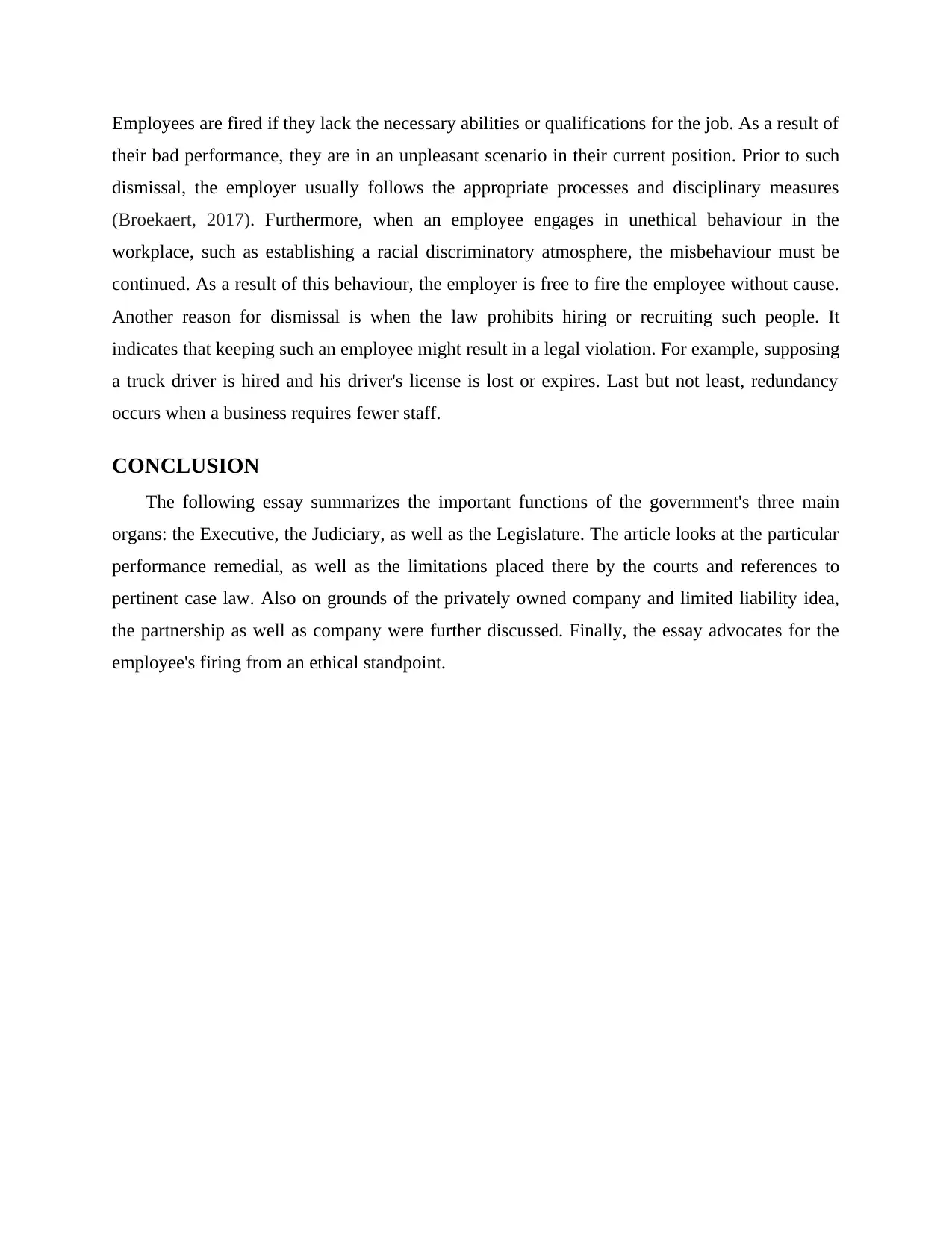
Employees are fired if they lack the necessary abilities or qualifications for the job. As a result of
their bad performance, they are in an unpleasant scenario in their current position. Prior to such
dismissal, the employer usually follows the appropriate processes and disciplinary measures
(Broekaert, 2017). Furthermore, when an employee engages in unethical behaviour in the
workplace, such as establishing a racial discriminatory atmosphere, the misbehaviour must be
continued. As a result of this behaviour, the employer is free to fire the employee without cause.
Another reason for dismissal is when the law prohibits hiring or recruiting such people. It
indicates that keeping such an employee might result in a legal violation. For example, supposing
a truck driver is hired and his driver's license is lost or expires. Last but not least, redundancy
occurs when a business requires fewer staff.
CONCLUSION
The following essay summarizes the important functions of the government's three main
organs: the Executive, the Judiciary, as well as the Legislature. The article looks at the particular
performance remedial, as well as the limitations placed there by the courts and references to
pertinent case law. Also on grounds of the privately owned company and limited liability idea,
the partnership as well as company were further discussed. Finally, the essay advocates for the
employee's firing from an ethical standpoint.
their bad performance, they are in an unpleasant scenario in their current position. Prior to such
dismissal, the employer usually follows the appropriate processes and disciplinary measures
(Broekaert, 2017). Furthermore, when an employee engages in unethical behaviour in the
workplace, such as establishing a racial discriminatory atmosphere, the misbehaviour must be
continued. As a result of this behaviour, the employer is free to fire the employee without cause.
Another reason for dismissal is when the law prohibits hiring or recruiting such people. It
indicates that keeping such an employee might result in a legal violation. For example, supposing
a truck driver is hired and his driver's license is lost or expires. Last but not least, redundancy
occurs when a business requires fewer staff.
CONCLUSION
The following essay summarizes the important functions of the government's three main
organs: the Executive, the Judiciary, as well as the Legislature. The article looks at the particular
performance remedial, as well as the limitations placed there by the courts and references to
pertinent case law. Also on grounds of the privately owned company and limited liability idea,
the partnership as well as company were further discussed. Finally, the essay advocates for the
employee's firing from an ethical standpoint.
⊘ This is a preview!⊘
Do you want full access?
Subscribe today to unlock all pages.

Trusted by 1+ million students worldwide
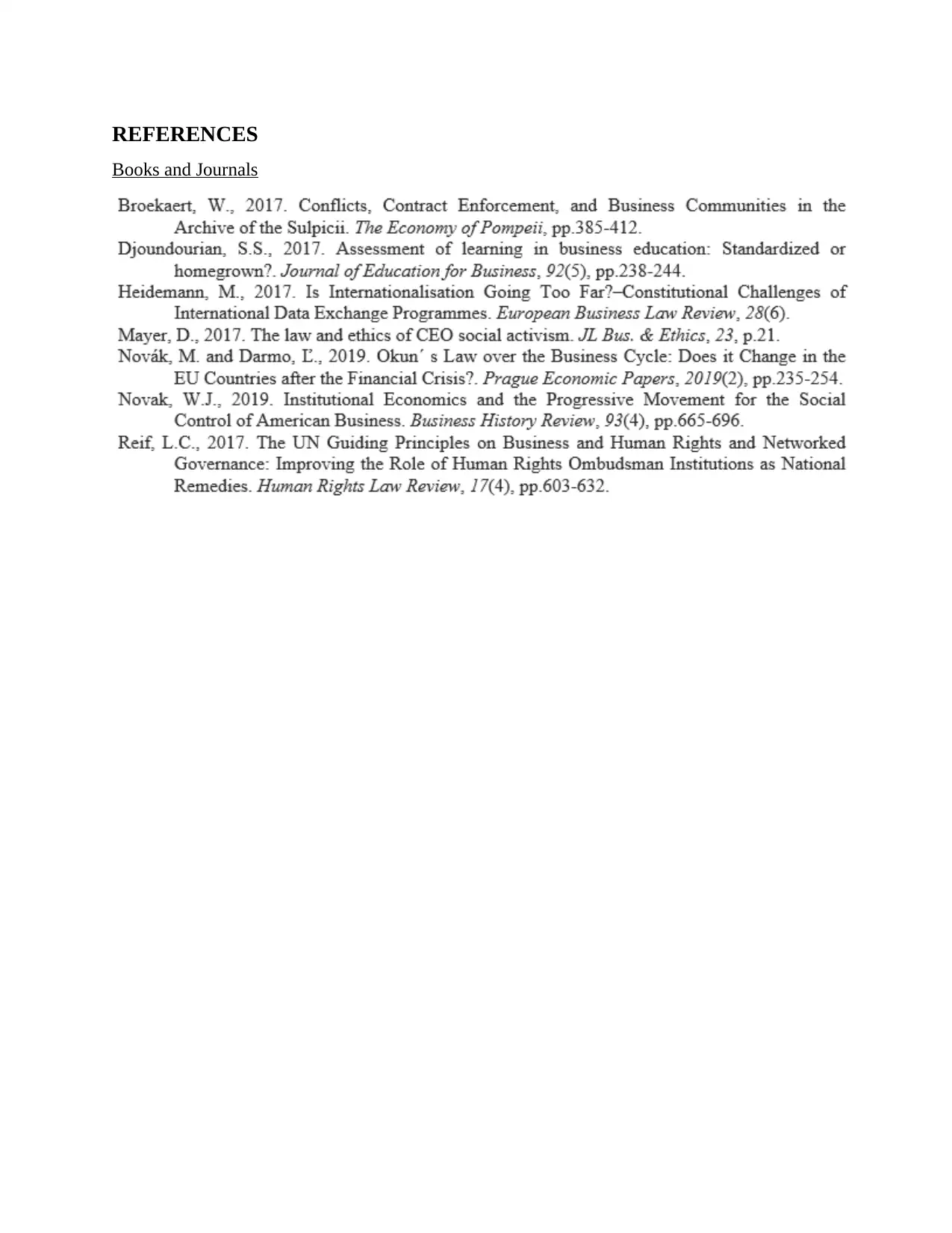
REFERENCES
Books and Journals
Books and Journals
1 out of 7
Related Documents
Your All-in-One AI-Powered Toolkit for Academic Success.
+13062052269
info@desklib.com
Available 24*7 on WhatsApp / Email
![[object Object]](/_next/static/media/star-bottom.7253800d.svg)
Unlock your academic potential
Copyright © 2020–2026 A2Z Services. All Rights Reserved. Developed and managed by ZUCOL.





